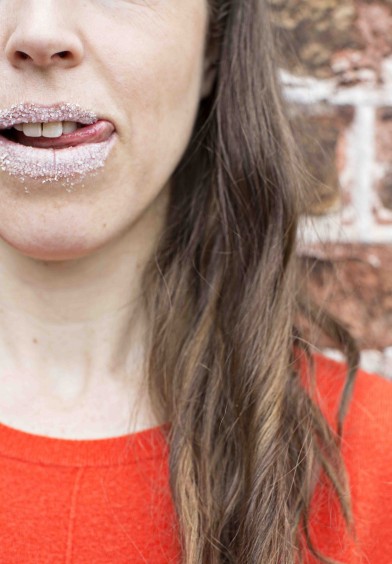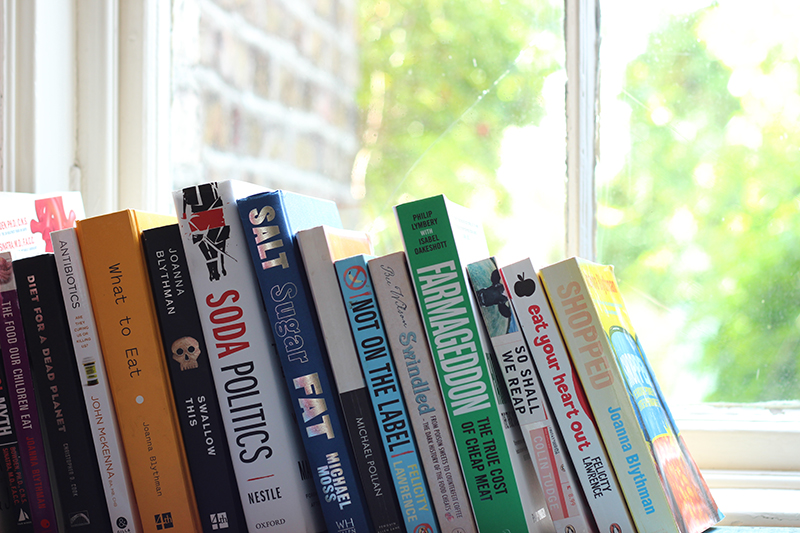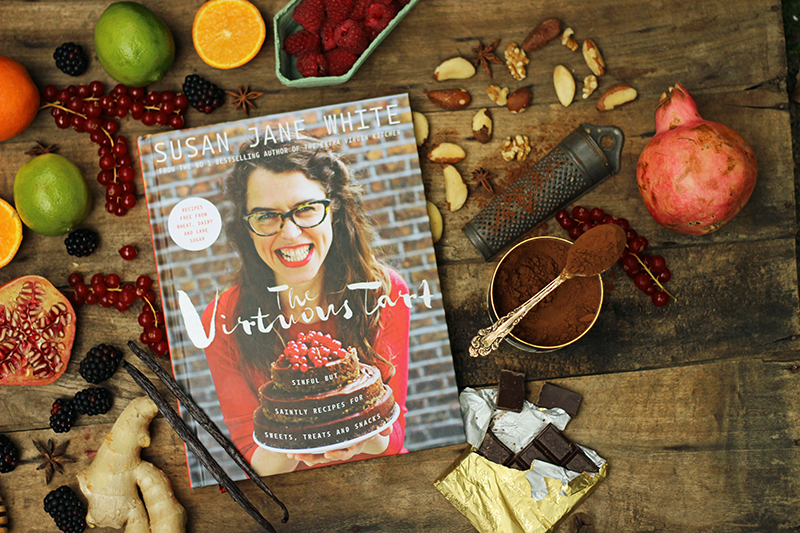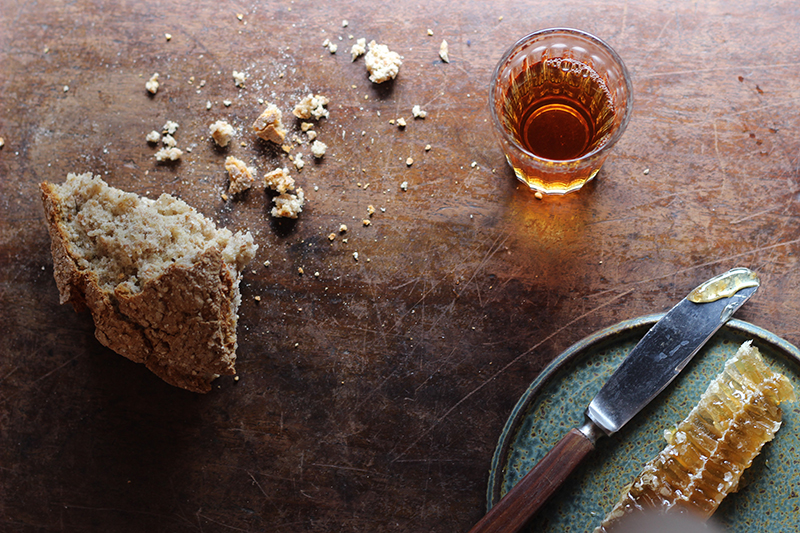Y’all, it’s a serious one. Let’s talk about food piracy – it’s not just our burgers.
We all know that a can of cola contains an obnoxious amount of sugar. So slimmers changed to diet cola in pursuit of a trimmer waistline and a cleaner conscience. But “sugar free” confectionery often contains as many preservatives or additives as a bottle of shampoo. Urgh.
Perhaps it makes better sense to switch to a probiotic yoghurt drink with promises of “boosting immunity with live healthy bacteria?” Think again. These little pots of expert-marketing can contain up to one third of our recommended daily allowance of sugar. And dead bacteria.
Frustrated and confused yet? I hear you!

Photography Jo Murphy, from The Virtuous Tart
Foods once contained high quality natural ingredients. Ask gran. Nowadays they are often saccharine artificial lab creations, full of grim delights such as hydrolyzed palm oil and high fructose corn syrup. And foods that are ostensibly “healthy” or “fortified” – such as breakfast cereals and jarred sauces – can be equally synthetic. Don’t be fooled into thinking food companies care about you or your health. They only care about your wallet.
Food is now largely conceived by laboratories and biotech firms, and marketed to appeal to a misguided sense of “good health.” In our honest yet futile attempt to watch our dress size, we have delegated accountability for our health and wellbeing to industrial food manufacturers. Why? Their aim is to make money. And lots of it.
If food manufacturers want to create the impression that there are blueberries in that ‘fruit’ yoghurt you had for breakfast, they can do so. Upwards of 4,500 flavouring compounds have been approved. In other words, fake flavours trying to mimic the real thing. Manufacturers have free-reign to alchemize muck into profit and pawn it off as food. What incentive does this leave them to offer us healthier – if admittedly more expensive – ingredients?
Big Food producers encourage us to consume a kaleidoscope of harmful or, at best, under-evaluated chemicals. Most worryingly of all, additives are not screened for their cumulative effect when combined with other chemicals and toxins in our bodies. I imagine this cocktail effect must have a negative impact on our over-burdened livers – don’t you? This is of little or no importance to food manufacturers. Why would it be?

Jo Murphy Photography, The Virtuous Tart
We are not eating real food anymore. Michael Pollan, food activist and professor of journalism at Berkeley, warns we are eating “edible, food-like substances no longer the products of nature but of food science.”
We each consume a noxious 13-15lbs (6-7kg) of food additives a year (see Felicity Lawrence’s Not on the Label). The danger they pose is well documented. A growing number of health experts attribute the distressing rise of obesity, cancer, depression, diabetes and heart disease to the unprecedented onslaught of additives and crap food. Fresh organic wholefoods, which provide crucial nutrients, minerals, omega oils and amino acids, are being replaced with preservatives, cosmetic enhancers and chemically enhanced fat. Legally.
In the meantime the global food additives industry is annually worth in the region of $20 billion. Indeed the use of cheap ingredients enables Big Food manufacturers to squeeze out high-cost rivals such as organic farmers, ethical co-operatives and small family businesses.
In short, we are being fed cosmetic junk, and it is making us ill. So ill, in fact, that we are digging our way to the grave with our teeth.
Our health insurance will rocket to unaffordable levels, our government will struggle to meet the demands of an already over-burdened medical system, and Irish industry will lose competitiveness as our workforce becomes increasingly unwell.
So what can we do?
Convenience foods aren’t likely to disappear from our shelves – and it’s equally unlikely that government will intervene on our behalf; such is the power of the Big Food lobby. That’s why it’s so important that we arm ourselves with information about the very real dangers that over-processed food poses. So the next time you find yourself reaching for that ‘diet’ cola, ask yourself whether it’s really such a smart choice. Vote with your wallet.

Here are 5 books that will change the way you shop. Forever.
My “Life-Changing Reading List” (you won’t find Joyce on this list. Relieved?) These are real life thrillers that involve YOU. Yes. That’s right. You. Investigative journalists go under cover and research what you are scarfing when we open that jar of pasta sauce, or “artisan” ravioli. There’s some brilliant stuff in here, that would make Inspector Morse look like a precocious toddler.
Promise yourself you’ll buy one today. It’s possibly the best tenner you will spend all year.
- “Not on the Label: What Really Goes into the Food on Your Plate” by Felicity Lawrence
- “Food Rules” by Michael Pollan
- “The Food Our Children Eat” by Joanna Blythman
- “Swindled – From Poison Sweets to Counterfeit Coffee” by Bee Wilson
- “Salt, Sugar, Fat: How the Food Giants Hooked Us” by Michael Moss
Also hugely informative, to earmark on your wish list:
- “Eat Your Heart Out” by Felicity Lawrence
- “Fat Chance: The Hidden Truth About Sugar” by Robert Lustig
- “The End of Overeating” by David A. Kessler, M.D.
- “Pure, White and Deadly” by John Yudkin
- “Swallow This” by Joanna Blythman
- “Farmageddon: The True Cost of Cheap Meat” by Philip Lymbery
- “Bad Food Britain” and “Swallow This” by Joanna Blythman
- “Anti-Biotics” by John McKenna
Twitter accounts to follow:
@KitchenBee
@DrBriffa
@LawrenceFelic
@FoodAwakenings
@ResponsibleFood
@MichaelMossC
Have anything to add? I’d love to hear your recommendations …





13 Comments
Thank you for taking the time to compile and share!
Very informative, I have marked a few titles I for my own education. Cheerio
Hi Susan.
Check this out if you can. http://www.health-science-spirit.com/borax.htm
Cheers
Colin
Thank you! Wonderful article. I live in NY NY — the big AG/Food attack is on, it is increasingly difficult (ie. time-consuming ) to buy organic wholesome foods even when you purposely search – and stores that purport to sell ‘wholesome’ foods ie. Whole Foods – have a lot of trash on their shelves. Check out the blog FoodBabe.com — she goes after one company, one ingredient at a time to get it out of the food supply. For instance, Subway sandwiches were using an additive in the bread to make it ‘squishy’, the same additive used in making yoga mats ‘squishy’…lets join the chorus…..LOVE your blog and cookbooks!
Thanks for such a glowing message! I’ll check her out straight away – sounds like my kind of woman . Big love to NYC. Can’t wit to return
Great article, have shared it to my business Facebook page so my clients can read it too. Thank you.
highfive! I’ve re-read most of them – and they still prove as shocking second time around
Hi Susan Jane, loving your blog! I’m a first year nutrition student in Oz and in the sea of information out there, it really stood out to me! I’ve added some of the recommended books to my ever expanding booklist! Thanks again
Delighted you found it. The best one to start with in my opinion is Not on The Label by FL. Good luck!
Susan Jane, have you published a “savoury”cook book? Would love dinner recipes or nmaybe I,ve missed it somehow!
Thanks
The Extra Virgin kitchen on Amazon 😉 It will be released in the States 2017 #highfive
Hi Susan Jane,
Really enjoyed this article.
I’m currently reading The Diet Myth: The Real Science Behind What We Eat by Tim Spector. Have you read this? I’m quite new to all this stuff!
It’s brillo! I haven’t read its entirety, but clocked the excerpts. Looks fantastic. Scary world we live in – full of money monsters and sociopaths.
The China Study by T. Colin Campbell. Buy it before you buy your first saucepan, cookbook, or cooker! A life guide to live by.